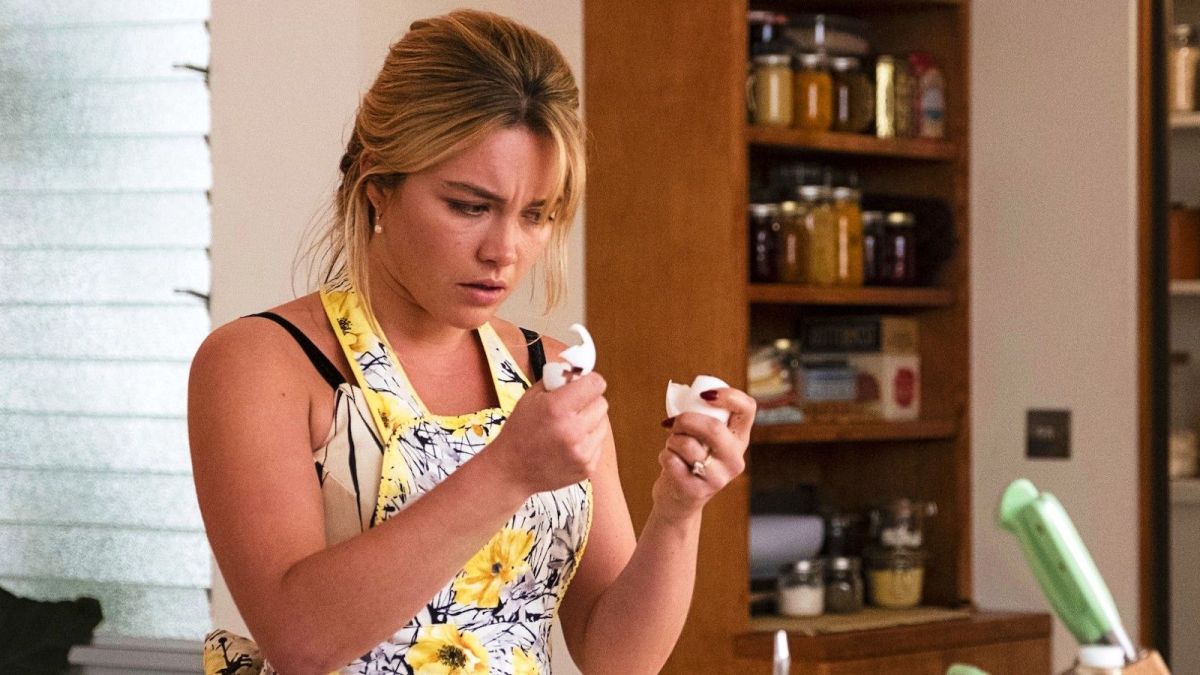It’s a bit too on the nose that so many elements about Don’t Worry Darling feel so right, you don’t want to fret over what’s wrong. Olivia Wilde’s sophomore directorial effort is a little murky on the message, but an entertaining ride bolstered by Florence Pugh’s mesmerizing performance and a strong supporting cast.
There is perhaps no more obvious choice than a 1950s setting if you’re going to make a movie about housewives who realize things are not quite what they seem. But visually, it’s an absolute treat, with cinematographer Matthew Libatique (Black Swan, A Star is Born) taking in the so-called “desert oasis” for all it’s got, from sweeping aerial car chases to toast crumbs on the counter.
DWD takes place in Victory, California, a commune-ish town where all the men work at a mysterious company, and all the women wave their husbands off every morning in unison. Children are expert mixologists in matching boater hats. A guy takes off a tie if a cooler guy isn’t wearing one. Wives (the women are all wives) occupy their time in four settings: the home, poolside, the mall, and ballet class.
The casting is impeccable. Pugh is a force; her ability to break down before a camera is well-documented, and here, you see the cracks in the foundation on her face. As Alice, a housewife whose day is more likely to get ruined by finding out the tuna salad she planned won’t work out than anything else; Pugh has a remarkable way of offering her scene partners firm warmth, like a crisis negotiator who baked you cookies.
If you need a guy to make out a lot, flirtily eat a carrot, dance in a bow tie and suspenders, and make a valiant but ultimately catastrophic attempt at mashed potatoes, you can’t really do better than Harry Styles. He’s dutifully charming as Jack, the perfect husband until you squint. However, the pop star can’t go toe-to-toe with Pugh when the drama ramps up. Styles nails the fragility as the dust settles and Jack retreats into his feeble self, but his performance during the actual confrontations isn’t particularly dimensional. And for anyone questioning the accent, yes, Jack is British…kind of, at least.
The supporting cast (including Wilde as Bunny, Alice’s best friend, and the most glamorous mom on the block) is great. Chris Pine as Frank, the man behind Victory, is delectably sinister. As his wife, Gemma Chan rarely gets the chance to speak but manages to pack a lot of punch with her steely, composed gaze.
Kate Berlant was born to be on camera with a flock of glitching tradwives. The comedian and actress, currently selling out her one-woman show plunging into the performance of ego, KATE, has a keen understanding of the tight-wire act women perform, recalibrating with every blink to avoid rocking the boat. Timothy Simons (Veep) gives just the right amount of ick as the town’s ethically dubious doctor. Nick Kroll plays the part of a guy you don’t want around that often who actually isn’t around that often with aplomb.
Unfortunately, the performances are not matched by a weak script from Carey and Shane Van Dyke that sat on the Black List until Wilde and Booksmart screenwriter Katie Silber took it on. The wives are rattled when a woman they once called a friend (Kiki Layne) dissents following a tragedy that could have done with less heavy-handed exposition. The movie seems unsure whether it wants to humanize her or treat her as a specter. Jack literally says, “don’t get hysterical,” like he’s checking off a Women On the Verge Movies checklist. It’s rife with hints that things are askew, like eggshells full of air, but the blips seldom feel in service of the characters or plot.
The movie may be best-remember for the noise offscreen, but it is fair to judge what a director promises the film will deliver. Wilde made the movie’s sex scenes, which all involve Jack pleasuring Alice, a primary talking point of the press coverage, to Pugh’s disappointment. Wilde is right in saying that a man prioritizing a woman’s desires is dynamic rarely seen on screen, but showing something is not inherently progressive.
Over the course of the film, we see how Jack uses oral sex as a weapon; it is not a means of celebrating his wife, but appeasing and distracting her to gain control and stroke his own ego while he’s at it. It’s baffling how anyone, much less the filmmaker, could interpret that as a win for women on screen. In one scene, the wives show disdain during a burlesque dancer’s performance at a company event. Their reactions (and her presence) felt utterly unexamined, missing an opportunity to provide texture to Victory’s sexual politics.
Don’t Worry Darling comes together in a jolt of a final act, particularly with Styles’ performance taking a sharp left, but the conclusion doesn’t quite feel earned, bringing up questions far too late for the film to answer them. When the lens eventually focuses on modern gender roles, it doesn’t linger long enough to say anything new. Still, it’s a solid dystopian movie oozing with style and engaging performances worth taking in.
Fair
There's a lot to like about Olivia Wilde's sundrenched sophomore directorial effort, particularly Florence Pugh's performance, but the story feels uneven.
Don't Worry Darling
